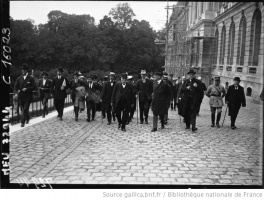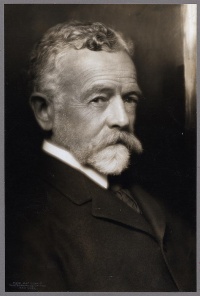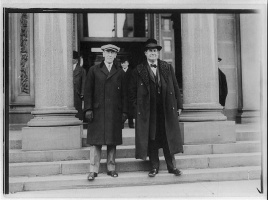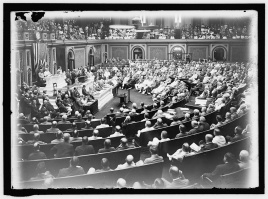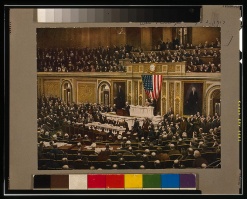Responding to War↑
Woodrow Wilson (1856-1924) had war aims long before his country entered World War I.[1] Though grieving the death of his first wife, Ellen Axson Wilson (1860-1914), he paid reasonably close attention to setting out the initial American diplomatic responses to the conflict. He strove to dampen possible popular passions, calling upon Americans to “be neutral in fact as well as in name,...impartial in thought as well as in action.”[2] Behind these moves lay an apprehension that the war might ultimately affect and possibly embroil the United States. Yet Wilson also discouraged his first Secretary of State, the long-time peace activist William Jennings Bryan (1860-1925), from considering mounting a public effort to mediate the war.
Wilson resisted Bryan’s proposals because he believed that the situation should be handled with great delicacy and that such moves would be ill-advised so early in the war and. Wilson first disclosed his larger war aims privately to his late wife’s brother early in 1915. He intimated that future world politics needed to be based on four principles: the end of territorial conquests, equality of rights among large and small nations, abolition of private manufacture of munitions, and “an association of nations, all bound together for the preservation of the integrity of each, so that any one nation breaking this bond must bring upon itself war; that is to say, punishment, automatically.”[3] Wilson was enunciating his core idea of collective security which would eventually become embodied in Article X of the Covenant of the League of Nations and would guide his thinking about war aims and peace-making for the rest of his presidency.
The great turning point in Wilson and America’s posture toward the war came on 7 May 1915, when a German submarine sank the British liner Lusitania, killing nearly 1,200 people, over 100 of them Americans. Wilson instantly grasped how his country’s stance toward the war might change radically. Now, he told Bryan, Americans fiercely harbored a “double wish,” to respond strongly to Germany “and yet to do nothing that might by any possibility involve us in the war.”[4] This was the age-old dilemma of peace with honor, made hideously painful by the carnage raging across the Atlantic and the menace beneath the seas; it set the limits of Wilson’s policies for the next two years, until the United States finally entered the war.
At first, Wilson devoted his greatest efforts to dealing with recurring crises with Germany over submarine warfare. At the same time, he fended off attacks from barely closeted interventionists such as ex-president Theodore Roosevelt (1858-1919), as well as from passionate anti-interventionists, now led by Bryan, who resigned as secretary of state rather than be party to risking war. After nearly a year of tortuous dealings, Wilson pressured the Germans to rein in their submarines and the threat of American intervention receded for the second half of 1916.
Wilson’s other strategy for keeping the United States out of the war lay in trying to end it and reform international relations along the lines he had previously laid out. He followed diverging paths to these ends. On the one hand, he sought mediation through the secret and often devious diplomacy of his unofficial emissary, Colonel Edward M. House (1858-1938). Together with the British Foreign Secretary, Sir Edward Grey (1862-1933), the colonel produced the March 1916 House-Grey Memorandum. House intended this move as a pretext for American intervention on the Allied side if Germany did not agree to mediation. House was not the only covertly pro-Allied advisor at the president’s elbow. Bryan’s successor as Secretary of State, Robert Lansing (1864-1928), also supported the Allies. House’s initiative came to naught because the British decided not to pursue mediation to end the conflict. A second approach to international reform lay in Wilson’s public endorsement in May 1916 of an international peace-keeping organization which was being promoted in America by the League to Enforce Peace, headed by the other living ex-president, William Howard Taft (1857-1930).
Peace without Victory↑
These broader efforts at mediation came to fruition at the end of 1916, after Wilson had won a narrow re-election victory. Over the objections of House and Lansing, Wilson dispatched a diplomatic note that asked all the belligerents to state their peace terms and pledged American participation in a post-war collective security arrangement. Soon after the note went out through diplomatic channels, Wilson again overruled his advisors and made it public. Both House and Lansing tried to undermine this move. The colonel privately assured his British contacts that the president was not really trying to mediate the war. Lansing went further and told the press that this was not a peace note but an effort to assess the situation because “we are nearing the verge of war ourselves.”[5] Infuriated, Wilson ordered Lansing to retract his statement. The secretary complied. The delicacy of the diplomatic circumstances prevented Wilson from firing Lansing on the spot.
The furor over the secretary’s statement drew maximum attention to this peace initiative. Lansing’s words may have influenced the British to make a mild, apparently encouraging reply to the overture. But the main influence behind the restrained response from London was the growing realization of their economic dependence on American loans and supplies for the Allied war effort. Wilson had deftly reminded the British of their financial plight by orchestrating a warning from the Federal Reserve Board against excessive foreign lending – the lion’s share of which was going to Britain.
Domestic debate likewise erupted over Wilson’s overture. Such pro-Allied stalwarts as Roosevelt and his friend Senator Henry Cabot Lodge (1850-1924) of Massachusetts denounced the move as playing Germany’s game, while other politicians, most notably Senator William E. Borah (1865-1940) of Idaho, excoriated the pledge to join an international peacekeeping organization as a departure from America’s traditional policies of isolation. Roosevelt, who had first broached the idea of such a collective security organization in his Nobel Peace Prize address in 1910, and Lodge, who had earlier proposed a “united nations” to maintain world order, now rejected the idea because, as he claimed, his thinking had changed and probably for partisan reasons. The pronouncements of Roosevelt and Lodge offered a foretaste of the post-war debate over American membership in the League of Nations.
Neither opposition at home nor a frosty response from Berlin deterred the president from continuing to mount his peace offensive. On 22 January 1917, he transmitted the text of a speech over the diplomatic wires and, without advance notice, delivered his famous “peace without victory speech” to a special session of the Senate. Wilson called for “a covenant of cooperative peace” to be guaranteed by the combined force of all nations. In order to achieve this, the war must end in “a peace without victory” not “a victor’s peace imposed upon the vanquished. ...Only a peace among equals can last. Only a peace the very principle of which is equality and a common participation in a common benefit.” Wilson now publicly stated his call for equality of rights for all nations. He urged that all people be able to choose their own governments and argued for free access to the world’s sea lanes for all countries. He sought to right “national wrongs,” as with “a united, independent, autonomous Poland.” Wilson claimed to be speaking “for the silent mass of mankind everywhere who have as yet had no place or opportunity to speak their real hearts out.” He also sought to disarm domestic critics by claiming he was proposing a worldwide Monroe Doctrine and seeking to rid the world of entangling alliances. “These are American principles, American policies. We could stand for no others.”[6]
Intervention, 1917↑
Without realizing it, Wilson was also laying out his program of war aims. Unbeknownst to him, this push for a compromise peace settlement came too late. The Germans had already decided to unleash their submarines which they did less than two weeks after Wilson spoke. The German leaders knew that their actions would almost certainly bring the United States into the war against them but they felt confident that they could cut the Allies’ supply lifeline from America and win the war before the Americans could arm themselves enough to make a difference. This gamble almost succeeded. Only the Royal Navy’s adoption of the convoy system, with additional ships deployed by the United States Navy, foiled this submarine campaign. Ironically, the Germans unleashed their submarines just as the British were about to run out of credit in the United States which would have curtailed overseas supplies with no danger of American intervention.
President Wilson agonized for two months before he finally chose to take the country into war. Neither the earlier clashes over the Lusitania nor this new submarine onslaught had appreciably increased interventionist sentiment, despite frenzied cries for war from Roosevelt, Lodge and others. Not even the unmasking of German intrigue (through the interception of the Zimmermann Telegram) to bring Mexico into the war against the United States, with promises of recovering Texas, New Mexico, and Arizona, added much fuel to calls for war. All indications of public and congressional opinion showed that great majorities still clung to the “double wish” to stand up to attacks but stay out of the war. Unlike a century earlier with James Madison (1751-1836) – to whom Wilson sometimes compared himself because they were fellow graduates of Princeton – this president did not find himself pushed into war by outraged public opinion and energetic war hawks in Congress. In the end, the United States entered World War I because Woodrow Wilson decided to do so. He could almost certainly have kept the country out if he had settled on that course instead.
Wilson chose to intervene for two reasons: one mundane and practical, the other lofty and deeply felt. Two months of unrestricted submarine warfare and a brief stab at armed neutrality convinced him that staying out of the war could be as harmful and vexing as entering the war, without the chance to affect its outcome and shape the peace that followed. Becoming a belligerent and playing a decisive role in an Allied victory would allow him to pursue the vision he had set forth in his “peace without victory” address. In his speech to Congress on 2 April 1917 which asked for a declaration of war, he stated, “I have exactly the same things in mind now that I had in mind when I addressed the Senate on the twenty-second of January last.” But now he gave this a new twist, stressing democracy, striving “to set up among the really free and self-governed peoples of the world such a concert of purpose and of action as will henceforth ensure the observance of those principles.” In the best remembered and most often misconstrued sentence of the speech, he declared, “The world must be made safe for democracy.”[7]
That utterance led many interpreters, particularly in later years, to assert that Wilson was calling for a crusade, a holy war to spread democracy in the world. But this use of the passive voice, by perhaps the most punctilious stylist ever to sit in the White House, undermined such a reading of his intentions. Moreover, a year later, he privately told some foreign journalists, “There isn’t any one kind of government which we have the right to impose upon any nation. So that I am not fighting for democracy except for the peoples that want democracy.”[8] In the remainder of his war address to Congress Wilson cast a somber tone, talking of his “solemn and oppressive duty” and “months of fiery trial ahead of us. It is a fearful thing to lead this great peaceful people into war, into the most terrible and disastrous of all wars, civilization itself seeming to be in the balance.”[9] In private, he felt even worse about what he was doing and told a sympathetic journalist that war would tear the country apart, foment mass hysteria and bring wholesale violations of free speech and civil liberties – an uncanny prediction of much of what did happen at home in the next eighteen months.
Given his grave doubts about the consequences of entering the war, it might seem strange that Wilson chose the course he did. He shed light on the deepest recesses of his thinking at the end of his war address in a stirring peroration about “our lives and fortunes” and spending America’s “blood and her might for the principles that gave her birth and happiness,” which echoed the Declaration of Independence and Abraham Lincoln. But he closed with a haunting and downbeat sentence: “God helping her she can do no other.”[10] This was an exact paraphrase of Martin Luther’s (1483-1546) declaration to the Diet of Worms: “God helping me I can do no other.” Wilson was casting his nation in the same role as Luther cast the Christian believer, as one who could never presume to know God’s will perfectly and who could not avoid sin, but must do the best one could and, in seeking to do God’s will, “Sin boldly!” Temperamentally, Wilson had an irrepressible bent toward bold action, and in this quandary, continued neutrality offered only passive spectatorship, whereas war offered bold action on the admittedly uncertain chance of making the world better and more peaceful.
Belligerency and the Fourteen Points, 1917-1918↑
After entering the conflict, Wilson tried to pull off a delicate feat. On the one hand, he prepared for all-out war. Contrary to aspersions from Roosevelt and others that he meant to fight a “feeble war,” he oversaw a miracle of mobilization that, by the war’s end a year and a half later, swelled the army from fewer than 500,000 men to over 4 million and transported 2 million soldiers to France to fight on the Western Front. Allied war plans envisioned crossing the Rhine early in 1919 and the subsequent conquest of Germany to be carried out mainly by American “Doughboys.” If that had happened, the last stages of this war would have looked much more like World War II, with the deployment of newly improved tanks and aircraft capable of longer sorties and much heavier bombing payloads. Germany’s capitulation with the armistice of 11 November 1918 kept that kind of war at bay for another generation.
On the other hand, Wilson meant to fight a war of limited ends. Acutely aware of the different circumstances and motives for belligerency that separated his nation from the Allies, he assiduously refused to identify an all-out common cause with them. Formally, he kept the United States from joining the Allies, calling his country an “Associated Power.” Substantively, he avoided what he considered overly close diplomatic cooperation and he insisted that the American Expeditionary Forces in France fight as a separate army under its own commander. That commander, General John J. Pershing (1860-1948), later recalled that the president gave him only one order which was not to merge his forces with the British or French. He also took a great interest in naval affairs and gave strong backing to his fleet commander, Admiral William S. Sims (1856-1936), in pushing the British to adopt the convoy system against the submarines as fast and fully as possible. On the whole, however, Wilson stayed out of military affairs and inserted himself in the management of the fighting less than any other war-time president.
Wilson’s biggest action to limit the ends for which the nation fought came with war aims. He held out for something less than total, sweeping victory. After consulting with various advisors, he took the initiative in defining the objects for which not only the United States but also the entire Allied cause was fighting. On 8 January 1918, the president spoke to a joint session of Congress. He reiterated that Americans wanted only “that the world be made fit and safe to live in it, and particularly that it be made safe for every peace-loving nation which, like our own, wishes to live its own life, determine its own institutions.” Then he laid out specific war aims, enumerated as Fourteen Points. The first five were general: “open covenants of peace, openly arrived at;” freedom of the seas; removal “so far as possible” of economic barriers among nations; reduction of armaments; “free, open-minded, and absolutely impartial” settlement of colonial claims, with due attention to indigenous peoples. The next nine were specific: fair treatment for Russia; evacuation of Belgium; return of Alsace-Lorraine to France; proper borders for Italy; “the freest opportunity for autonomous development” for the peoples of the Austro-Hungarian Empire; independence for Balkan states and fair treatment for both Turks and other peoples of the Ottoman Empire; and an independent Poland with access to the sea. The final point called for a “general association of nations...under specific covenants for the purpose of affecting mutual guarantees of independence and territorial integrity to great and small states alike.”[11]
The enumeration of the Fourteen Points crystallized and refined Wilson’s thoughts since the beginning of the war and put flesh on the bones of the idea of “peace without victory.” He sought to rally war-weary and skeptical elements in Britain and France. The British Prime Minister, David Lloyd George (1863-1945), had also tried to do this a few days earlier by giving a grandiloquent speech full of sweeping promises of “self-determination” and independence for the peoples of the empires in the enemy camp. The words “self-determination” never appeared in the Fourteen Points address, and, although Wilson later used the phrase, he remained cautious about promising to break up the empires of the Central Powers or grant independence to colonies. Contrary to later criticisms, Wilson enunciated a limited, measured program in the Fourteen Points, not a utopian vision of instant change. He was also trying to induce the Russian Bolsheviks, who had opened peace talks with the Germans at Brest-Litovsk, not to desert the Allied side. Finally, he appealed to the Germans to rethink whether they wanted to continue fighting and held out something resembling “peace without victory,” under which they would not suffer great losses.
In the short run, the Fourteen Points succeeded in only the first aim. Wilson carried great credibility as the leader of a nation that sought no territorial or economic spoils from the war and as someone who had spoken out for peace and democracy before entering the conflict. Generally, left-wing elements in the Allied nations warmed to his message. Propaganda agencies translated the Fourteen Points into the languages of the Central Powers and smuggled them into those countries and dropped leaflets over the German and Austrian lines. As an inducement to Russia’s remaining in the war, the initiative failed. The Bolsheviks swallowed crippling terms at Brest-Litovsk as the price of leaving the war. The Germans ignored the implied olive branch and Wilson took the settlement they exacted from the Russians as proof of their perfidy. With echoes of Roosevelt, he declared, “There is, therefore, but one response possible from us: Force, Force to the utmost, Force without stint or limit, the righteous and triumphant force which shall make Right the law of the world and cast away selfish dominion down to the dust.”[12]
The Armistice↑
Militancy did not last. Privately, Wilson eschewed “the language of braggadocio” and claimed he had “no desire to march triumphantly into Berlin.”[13] In the next few months, he supplemented the Fourteen Points with statements that continued to hold out the prospect of a non-punitive peace and to make non-specific promises about an international peacekeeping organization. These moves ultimately bore fruit. The failure of the Germans’ massive offensive on the Western Front in the spring and early summer of 1918 and the arrival of ever-swelling numbers of Doughboys, together with unrest at home, induced their military leaders to extend feelers to Wilson in the autumn for a conditional surrender on the basis of the Fourteen Points. Without consulting the Allies, the president responded that he would negotiate only with representatives of the German people, not the autocracy that he blamed for the war. The military-dominated government in Berlin then stepped aside in favor of civilian leadership responsible to the Reichstag.
Next, Wilson waged a two-front diplomatic campaign to secure the Armistice. On one side, he held firm against any German attempts to retain arms and the ability to resume fighting. On the other side, he wrestled with the British and French leaders who had a long list of territorial, military, naval, colonial and financial demands. Colonel House, who would retain the president’s confidence until later at the peace conference, conducted these dealings with the Allies and artfully brought them to accept the Fourteen Points without actually abandoning their demands. Even House’s admirers have conceded that his persuasiveness spelled future trouble at the peace negotiations. But for the moment all went well. The Armistice, which went into effect on “the eleventh hour of the eleventh day of the eleventh month,” ended World War I to near universal jubilation.
Conclusion↑
The Armistice was a triumph for Wilson. It constituted his greatest feat of foreign policy. He shortened the war by months and thereby helped save perhaps hundreds of thousands of lives, avoiding the massive destruction that an invasion of Germany and “fight to the finish” would bring. Triumph also sowed seeds for the shortcomings and ultimate failure of the peace that would follow. If the war had lasted only a few months longer, the victorious Allies would have been almost totally dependent on the United States and Wilson knew that he could have dictated virtually any terms he wished to victors and vanquished alike. Instead, at the peace conference in Paris in 1919 he would have to bargain, cajole, threaten and compromise, and he and his fellow leaders there would draft “the peace that failed.”
John Milton Cooper, University of Madison-Wisconsin
Section Editor: Edward G. Lengel
Notes
- ↑ For other approaches to the matter of war aims, see, for example, Mayer, Arno J.: Politics and Diplomacy of Peacemaking. Containment and Counterrevolution at Versailles, 1918-1919, New York 1967 and Tooze, Adam: The Deluge. The Great War and the Remaking of Global Order 1916-1931, London 2015.
- ↑ Wilson statement of 18 August 1914 in Link, Arthur S. (ed.): The Papers of Woodrow Wilson. Volume 30, Princeton 1966-1993, p. 304.
- ↑ Ray Stannard Baker interview with Stockton Axson, 8-11 February 1925, Ray Stannard Baker Papers, Library of Congress, Box 29.
- ↑ Wilson to William Jennings Bryan, 7 June 1915 in: Link, Papers of Wilson, volume 33, p. 329.
- ↑ Anonymous, New York Times, 22 December 1916.
- ↑ Speech, 22 January 1917 in: Link, Papers of Wilson, volume 40, pp. 533-539.
- ↑ Speech of 2 April 1917 in: Link, Papers of Wilson, volume 41, pp. 521-526.
- ↑ Remarks, 8 April 1918 in: Link, Papers of Wilson, volume 47, p. 269.
- ↑ Speech of 2 April 1917 in: Link, Papers of Wilson, volume 41, pp. 526-527.
- ↑ Ibid.
- ↑ Speech, 8 January 1918 in: Link, Papers of Wilson, volume 45, pp. 534-538.
- ↑ Speech, 6 April 1918 in: Link, Papers of Wilson, volume 47, p. 270.
- ↑ Remarks, 8 April 1918 in: Link, Papers of Wilson, volume 47, p. 268.
Selected Bibliography
- Cooper, John Milton, Jr.: Woodrow Wilson. A biography, New York 2009: Alfred A. Knopf.
- Kennedy, Ross A.: The will to believe. Woodrow Wilson, World War I, and America's strategy for peace and security, Kent 2009: Kent State University Press.
- Knock, Thomas J.: To end all wars. Woodrow Wilson and the quest for a new world order, New York 1992: Oxford University Press.
- Link, Arthur S.: Woodrow Wilson. Revolution, war, and peace, Arlington Heights 1979: AHM.
- Link, Arthur S.: Wilson, 5 volumes, Princeton 1947: Princeton University Press.
- Wilson, Woodrow: The papers of Woodrow Wilson, 69 volumes, Princeton 1966: Princeton University Press.






